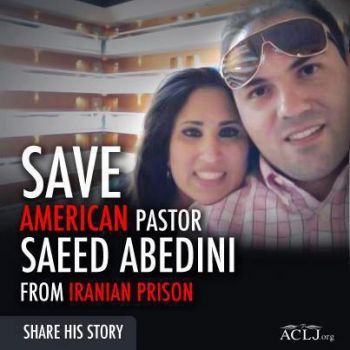Pressure stepped up for US pastor 'tortured' in Iran jail

With his treatment in Iran's most notorious prison worsening and the prospect of coming elections closing the door on the possibility of his release, the campaign on behalf of U.S. pastor Saeed Abedini is intensifying.
The Iranian-American was arrested in September and is being held in Tehran's Evin Prison.
The Iranian authorities took him into custody because they say his Christian ministry with home churches in the country, endangers national security.
However, his supporters say he was doing humanitarian work.
Abedini was sentenced to eight years in prison in January.
The pastor, from Boise, Idaho, is in the "battle of his life" according to a reporter for his hometown newspaper. Katy Moeller of the Idaho Statesman updated his case and the efforts to free him on Friday.
She reported the latest news on Abedini from the American Center for Law and Justice (ACLJ), a legal and human rights group that represents Abedini's family in the United States,
The center indicated that he is being beaten and tortured in Evin Prison and suffering from internal bleeding following information coming from his parents, who are allowed to visit him weekly.
Abdedini is suffering intense pain according to the ACLJ.
The center says Iranian prison authorities have told him it will be another two months before he receives any treatment for his injuries.
Abedini was recently taken to a hospital and turned away. When he was returned to the prison, he was beaten.
In addition to the physical suffering, the former Muslim is being pushed by his Iranian captors to recant his Christian faith.
They have threatened to keep him in prison longer than eight years if he does not.
Abedini's faith appears to be holding, however as the ACLJ reported this week that he was praying for America after the bombings at the Boston Marathon.
Looming in June are elections in Iran.
Tracy Barrans, international legal director for ACLJ said in the Statesman that "during and around those elections, the Iranian government is not going to want to release anyone who is oppositional."
Barrans said the best way to secure Abedini's release is pressure on the government, especially from countries that have ties to Iran. The U.S. has no diplomatic representation in Teheran.
ACLJ is working to gain support for Abedini from countries such as Qatar, Italy, Argentina and Brazil.
Despite Abedini's plight, there has been some positive news coming out of Iran.
Barrans indicated that human rights groups inside Iran are now taking up his cause. She said that the potential for public disturbances on behalf of Abedini may cause Iran to relent in his case.
"They may decide it's not worth the unrest during their elections", said Barrans.
Iran is getting pressure from other quarters as well.
More than half a million people have signed a petition asking that Abedini be released.
U.S. Secretary of State John Kerry called for his immediate release in March.